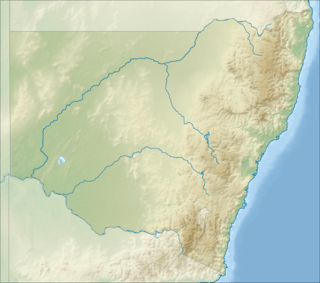Molong railway station
Molong railway station is a heritage-listed former railway station and now library on the Main Western railway line at Molong, Cabonne Shire, New South Wales, Australia. The property was added to the New South Wales State Heritage Register on 2 April 1999.[1]
| Molong railway station | |
|---|---|
.jpg) The station building in 2017 | |
| Location | Main Western railway, Molong, Cabonne Shire, New South Wales, Australia |
| Coordinates | 33.0933°S 148.8717°E |
| Owner | Transport Asset Holding Entity |
| Official name: Molong Railway Station and yard group | |
| Type | state heritage (complex / group) |
| Designated | 2 April 1999 |
| Reference no. | 1196 |
| Type | Railway Platform/ Station |
| Category | Transport - Rail |
 Location of Molong railway station in New South Wales | |
History
The station opened in 1885, and was the terminus of the line between 1886 and 1893. It is now closed to passenger services.[2][3]
The station closed in the early 1990s. The goods shed was demolished at that time, and the station was also faced with prospective demolition, but was saved by the efforts of local residents.[4]
Of timber construction, the station survives largely intact, is well maintained and is in use by various local community groups and a branch of the Central Western Libraries. North of the station (westwards along the railway) lies the junction point to the now-closed Molong- Dubbo railway line.
The library will be relocated from the station building in late 2018, resulting in concern for the building's future.[4]
Description
The heritage-listed complex includes a timber station building of a type 4 standard roadside design with a brick platform dating from 1885. It also includes a gable-roof, pre-cast concrete signal box dating from 1924. Two locomotive water columns dating from c. 1900, the timber road overbridge, and the Bunya pine (Araucaria bidwillii) tree outside the station are also included in the heritage listing.[1]
Heritage listing
.jpg)
Molong is an excellent example of a standard timber wayside station with excellent detailing a good setting and good supporting buildings. The station has prominence in the main street and is an important visual part of the historic character of the town. The station building is the main element of the group but its setting is important to the way the buildings are seen in the town.[1]
The bridge is a good example of a once common but now rare timber bridge structure.[1]
Molong railway station was listed on the New South Wales State Heritage Register on 2 April 1999 having satisfied the following criteria.[1]
The place possesses uncommon, rare or endangered aspects of the cultural or natural history of New South Wales.
This item is assessed as historically rare. This item is assessed as arch. rare. This item is assessed as socially rare.[1]
See also
References
- "Molong Railway Station and yard group". New South Wales State Heritage Register. Office of Environment and Heritage. H01196. Retrieved 2 June 2018.
- Molong station, NSWrail.net, accessed 11 August 2009.
- Guide to molong. Sydney Morning Herald.
- "Saving the Molong railway station". The Molong Express and Western Districts Advertiser. 25 May 2018. Retrieved 27 June 2018.
Bibliography
- "Molong Railway Station and yard group". 2007.
- Attraction Homepage (2007). "Molong Railway Station and yard group".
Attribution
![]()
External links
![]()
| Preceding station | NSW Main lines | Following station | ||
|---|---|---|---|---|
Pinecliffe towards Broken Hill | Broken Hill Line | Amaroo towards Orange |
||
| Preceding station | NSW Closed lines | Following station | ||
Larras Lee towards Dubbo | Molong–Dubbo line | Terminus |